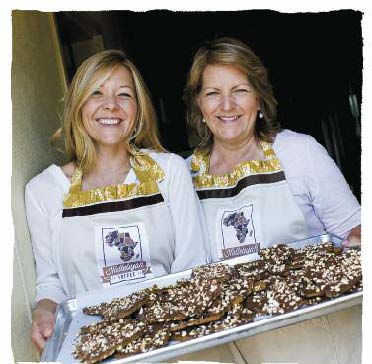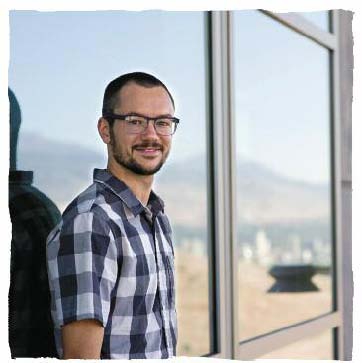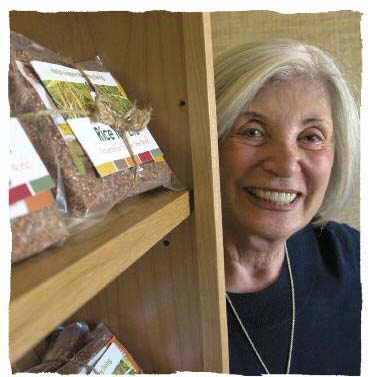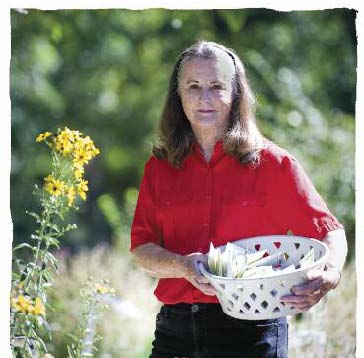feature
GUARDIANS OF THE GLOBE
Through food and water projects, locals help people around the world.
WRITTEN BY STINA FAUSONE
PHOTOS BY CANDICE NYANDO
In so many ways, food reflects who we are — what we like, where we live, and what cultures and traditions we uphold. For the 795 million of the earth’s people who are food insecure, food represents an uncertain future.
Fortunately, organizations and individuals work tirelessly every day to help ensure a food-secure future for people around the world — many of them right here in the Reno-Tahoe area. Meet a few of the local folks in your community championing the effort to bring safe and sustainable food and water to less fortunate countrymen around the globe.
Rebuilding agriculture
Dawn Hammond is ambitious. A graduate of the University of California, Berkeley, with a Ph.D. in medical and nutritional ethnobotany, the Reno resident has made it her life’s work to research how people in different cultures use plants as food and medicine to improve their health. She does this through a seed exchange program.
“Toward the end of the summer season, I start to reach out to area nurseries, conservatories, greenhouses, arboretums, even friends that I know who have been successful in their personal gardens, in search of interesting and hardy seeds,” Hammond says.
It started 16 years ago, when she began shipping those seeds overseas to the Mayan leaders in Yucatán and colleagues in the Czech and Slovak Republics, then visiting the regions later to observe the seeds’ growth and how the people of these various cultures put them to use.
“It was interesting to watch the difference between what the Maya would plant versus the Czech and Slovak people,” she says. “The Maya focus mainly on medicinal usage, using ancient methods focusing predominately on herbs such as oregano, basil, and rosemary. I’ve sent over kale, cucumbers, okra, you name it, to the Czech and Slovak Republics, anything I thought that might be useful.”
Hammond chose these regions due mostly to the war and conflict involving those areas during World War II.
“I wanted to collect seeds that these cultures didn’t have contact with in the past,” she says. “Maybe at one point certain plants flourished, but due to the war and the domination of these regions, they lost touch with so much of their agriculture. I felt it was my responsibility to help grow it back.”
Hammond now sends a variety of plant seeds, including flowers and even succulents. Her continued efforts in the Seed Exchange Program not only have shed light on major economic and agricultural issues in the region, but also have provided a means for growth and renewal.

Treats for thought
Karen Berger began making toffee to sell in the teachers’ lounge at Galena High School in Reno so her husband, Craig, could pursue his graduate studies at the University of Nevada, Reno. But once he’d finished, Karen figured she would retire from her stove — that is, until talking to a family friend from Kenya, Andrew Onguka.
“We were told about these children, children who rank at the very top of their entire country for educational performance and personal ambition, but who simply are lacking the funds for high school,” she says. “All they needed was someone to say, ‘You are worth investing in,’ and each of them was. That’s when we began our partnership with (Onguka’s mentorship and scholarship program) OneLife Africa in 2011.”
And that’s when Hallelujah Toffee was born.
Karen, Craig, and her mother and father, Greg and Jeannie Burns, set out to make a difference in a small Kenyan society by raising money the same way they had for Craig’s schooling. But this time, it was for a whole community.
The following year, in early spring 2012, Karen traveled to Onguka’s village in Kenya. After connecting with members of the small community and witnessing firsthand the challenges and hardships the children faced, she and her family set to work immediately.
“It started out so small,” Jeannie Burns says. “We never thought it would grow to what it was. Andrew inspired us, and our hearts and our faith drew us to his village. We just wanted to do as much as we could for the so-very-talented and intelligent children we met when we were in Kenya.”
Hallelujah Toffee has since grown to close to 100 volunteers, and the company delivers more than 3,000 pounds of toffee each year, providing a full year of education for more than 40 students — or partially funding it, in cooperation with other donors. All profits are donated to OneLife Africa, a program that offers scholarships for youths to attend year-round school and summer camps, as well as providing medical emergency funds and fully paid room and board.
“We have a two-fold vision: to provide scholarships to high school students in Kenya, and to provide local community opportunities in Northern Nevada,” Karen says. “For us, Hallelujah Toffee is not just about giving scholarships to kids in Kenya. It’s about giving this Northern Nevada local community the opportunity to serve others, to see the world as bigger than our own region.”
For details, visit http://www.Hallelujahtoffee.org

Thirsting to help
Dan Saftner, a graduate research assistant at the Desert Research Institute in Reno, knows firsthand the power that clean water has on a community.
After earning a bachelor degree in geology from the Indiana University of Pennsylvania, Saftner spent two years in Cameroon as a Peace Corps volunteer. Although his primary work was teaching high school physics, when he wasn’t in the classroom, Saftner focused on addressing local issues related to water and sanitation.
Saftner obtained a United States Agency for International Development grant that provided funding, and with the help of a fellow teacher, Edwin Fogwe, was able to dig a well and install an automated hydraulic groundwater pump at their school.
“This project created clean drinking water for more than 3,500 students and 200 more people that were part of the faculty,” Saftner says. “Once I realized the positive impact that drinking water can have on a community, especially students, I knew that this was something I wanted to continue doing in the future.”
Saftner earned a Fulbright Student Scholarship that will enable him, during the 2016-17 school year, to work alongside a group of specialists in water and sanitation, under the advisement of Alexandra Lutz, Braimah Apambire, and Greg Pohll, (all faculty researchers at the DRI), in partnership with World Vision Niger and the Niger Rural Water Project.
Saftner hopes to measure the seasonal changes in groundwater at different boreholes and hand pumps in Niger to gauge the extent of chemical contamination in the water.
“More importantly, we are looking to better understand the factors that control the water quality at different times of the year, such as precipitation chemistry or the local geology,” Saftner says.
In 2015, Niger ranked last on the United Nations Human Development Index, with the lowest level of social and economic development of any country in the world. Nearly two-thirds of Niger’s rural population does not have access to a supply of safe drinking water, and 96 percent have no access to sanitation facilities, Saftner says. By creating a safe and sustainable water supply, this project will help enhance the understanding of groundwater resources and reduce the number of water-related illnesses and deaths.
For details, visit http://www.Dri.edu

Foods for the future
Jayanath Abeywickrama — fondly referred to as Dr. Abey by those who know him — is an Ayurveda physician who belongs to a lineage of 31 generations of a traditional Hindu system of medicine, and a man who believes that healing people starts with changing the way they view food.
After spending years winning the trust of rural Sri Lankan farmers, Abeywickrama learned of the ancient collections of rice that were furtively hidden for more than 500 hundred years.
Working with these rural farmers, he began his mission to enlighten others by bringing awareness to the food we eat through his rice project, Hela Bima World, by growing 2,000-year-old ancient varieties of rice without the use of chemicals or harmful fertilizers.
Shari Chase, vice president of Hela Bima World (as well as founder, president and CEO of Chase International Real Estate in the Reno-Tahoe area), began her journey with Abeywickrama after meeting him for the first time in Egypt.
“I was traveling in the steps of the ancients when I met Dr. Abey in the Great Pyramid of Giza,” Chase says. “It was on 10-10-10, a very auspicious date, and my life was changed forever. After hearing Dr. Abey’s story, we began to consider the benefits of forming a nonprofit.”
The name they selected was strategic: Hela means “light,” and bima means “land,” so together it became the perfect name to support the organization’s mission.
All money earned by Hela Bima World’s Rice Project is returned to the farmers who are growing the grain in Third-World countries. This money funds biodynamic training and schooling for farmers and their families. By teaching these methods, Hela Bima World strives to create a viable and honest environment for grains.
“Our rice is produced using nothing but the earth, water, sunlight, and ancient farming techniques that would have been lost if it weren’t for Dr. Abey,” Chase says. “With help from the local community, we can spread the message of joy, health, and success across the globe.”
For details, visit http://www.Helabimarice.com.
Lake Tahoe-based writer Stina Fausone is excited to explore the local organizations in her community that help those who are less fortunate. She hopes that the work these local heroes have done inspires others to do the same.


